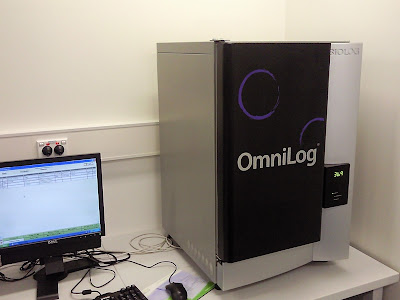First stop on tours around the Paulsen lab is usually our
Biolog Omnilog instrument (a note from our sponsors- this instrument was purchased
by grant support from the Australian Research Council). This is the only
Omnilog machine in Australia, a fact that is mentioned in almost every grant we
write. The Biolog instrument gives us the capability of screening bacteria for
2000 functions simultaneously; e.g., testing their ability to grow on different
carbon compounds, their resistance to various drugs and toxic compounds, or
their ability to withstand various stresses. These tests are performed in a
96-well plate format where each well contains the specific compound we are
testing.
2000 cellular functions may sound like a lot, and it certainly beats making up 2000 separate agar plates to test each function. However, it is only testing a tiny fraction of the functional diversity that exists out there in the microbial world. Recently, we have been making our own “custom” Biolog plates by taking blank plates, adding in the Biolog proprietary buffers and dye, but then adding in the specific compounds we would like to test. For instance, we are interested in bacteria that grow on plant roots and provide beneficial effects for the plant, and we would like to know why particular bacteria prefer specific plant species. So we have been making our own Biolog plates that include specific compounds that the plant species secrete to find out what these bacteria like to eat.
We’re also happy to collaborate with other research groups; if you have a unique and interesting problem that might benefit from customized Biolog analyses, feel free to contact us.
 |
| it even matches the colour scheme of our lab! |
Superb blog entry. This is total enchantment from you! I have never observed a more superb post than this one. Pay Someone to Do my University Assignment UK
ReplyDelete